About the Books
Penman of the Founding: A Biography of John Dickinson
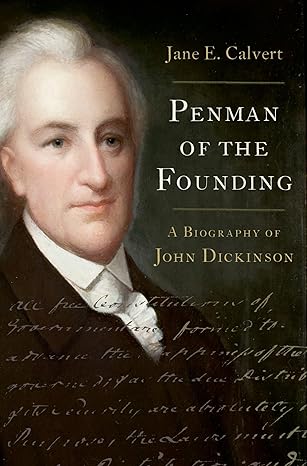
This engaging and accessible volume powerfully restores John Dickinson’s centrality to the American Revolution, and rescues him from the mythology and mischaracterization that have surrounded him. Calvert challenges the prevailing view of Dickinson as a conflicted moderate who hesitated over independence. As the editor of the Dickinson Papers, Calvert brings a peerless understanding of her subject and of the Pennsylvania Quaker culture from which he emerged. Calvert underscores Dickinson’s significance as “the draftsman for the Founding as an architect drafts plans of a building” (438). Dickinson authored America’s most transformative and widely disseminated political tract before 1776, the Letters from a Farmer in Pennsylvania, which was published in newspaper, pamphlet, and musical forms. He was a member of the First and Second Continental Congresses; an early advocate of the “Causes and Necessity of Taking up Arms” in defense of American rights and a Delaware militia soldier; the principal architect of the United States’ first written constitution, the Articles of Confederation; and an important framer and advocate for the 1787 Constitution at the Philadelphia Convention.
In Calvert’s gripping biography, readers encounter a complex portrait of a founder who wrestled with enduringly relevant questions regarding American rights and government. Dickinson took a principled moral stand against slavery and was one of the most prominent revolutionaries who manumitted his slaves and envisioned rights for freedpeople. He articulated early notions of equal rights of women and men, derived from Quaker influences as well as revolutionary ideology. Dickinson also envisioned an educated citizenry in the new nation, lending his name and support to the establishment of Dickinson College in Carlisle, Pennsylvania in the 1780s. In sum, Calvert’s volume is the first exhaustive biography of John Dickinson and a decisive contribution to our understanding of this central leader of the American Revolution.
A Revolutionary Friendship: Washington, Jefferson, and the American Republic
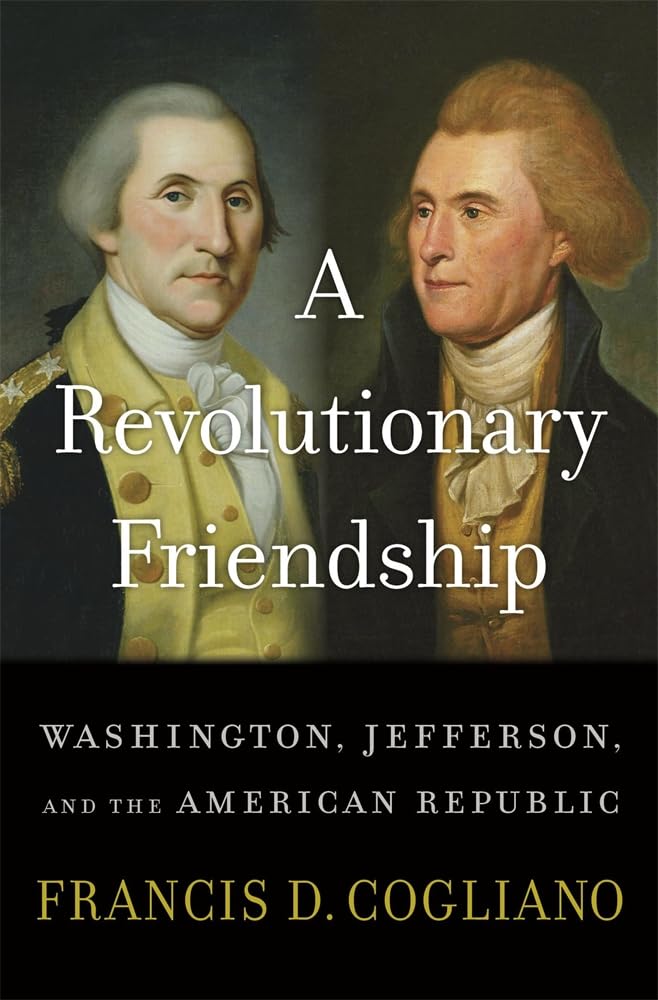 This lively work is the first and finest exploration of the complex friendship between George Washington and Thomas Jefferson, an approach that humanizes these two founders whose lives summarize so much of the revolutionary era. Cogliano skillfully frames their thirty-year relationship between the pair’s initial meeting in 1769 in the Virginia House of Burgesses and Washington’s death in 1799. By then, their revolutionary friendship had become estranged amid partisan debates and political differences during the Washington and Adams presidencies. Jefferson and Washington never reconciled, in contrast to Jefferson and John Adams, who resurrected their friendship through correspondence in their final years. Cogliano insightfully argues that the well-known falling out between Washington and Jefferson in the 1790s has obscured the harmonious collaboration and warm friendship between the two leaders, knit together by their common Virginia culture and revolutionary values.
This lively work is the first and finest exploration of the complex friendship between George Washington and Thomas Jefferson, an approach that humanizes these two founders whose lives summarize so much of the revolutionary era. Cogliano skillfully frames their thirty-year relationship between the pair’s initial meeting in 1769 in the Virginia House of Burgesses and Washington’s death in 1799. By then, their revolutionary friendship had become estranged amid partisan debates and political differences during the Washington and Adams presidencies. Jefferson and Washington never reconciled, in contrast to Jefferson and John Adams, who resurrected their friendship through correspondence in their final years. Cogliano insightfully argues that the well-known falling out between Washington and Jefferson in the 1790s has obscured the harmonious collaboration and warm friendship between the two leaders, knit together by their common Virginia culture and revolutionary values.
Despite their different paths to Virginia’s elite slaveholding ranks, Washington and Jefferson were both animated by common principles and aims: a commitment to republican government; a vision of orderly western expansion; and a resolve to defend American rights at all hazards. Their friendship “had been a plant of slow growth, born of the adversity of revolution and war, by 1783,” Cogliano writes (150). During the 1780s, both men increasingly leaned on one another for counsel, advise, and intimacy, especially as they navigated an eight-year war, the travails of the confederation, and moral questions such as slavery (both men, Cogliano argues, were “anti-slavery slaveholders who largely failed to act against slavery” [276]). As a parable for our own time, their friendship did not withstand the political rancor and divisions of the early federalists and republicans in the 1790s, especially on the issue of U.S. policy towards the French Revolution. Yet Cogliano maintains that in their vision for the republic, the two leaders were more united than not on core issues, which explains why “the election of 1800 marked the beginning of Jefferson’s attempt to repair his relationship with Washington” (284). In 1801, Jefferson traveled to Mount Vernon to pay his respects to Martha and visit Washington’s grave—a visit that Martha did not appreciate but that Jefferson may have intended as a reconciliatory gesture. At his inauguration, President Jefferson struck a “Washingtonian pose” as a unifying national leader, praising Washington in his inaugural address and remembering him as “our first and greatest revolutionary character” (286).
The Memory of ’76: The Revolution in American History
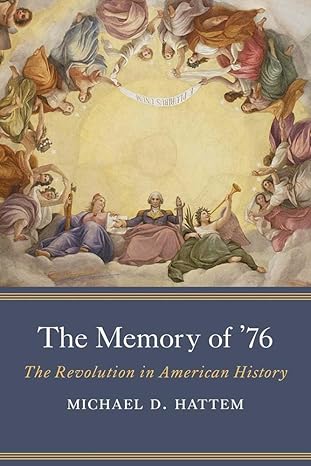 In this impressive and intriguing work, Michael Hattem explores the myriad ways that Americans over the last two hundred and fifty years have cherished their origin myth of the American Revolution, while also remaining divided over the larger meanings of the Revolution’s significance. As Hattem deftly explains, from the death of George Washington through Civil War and through the 9/11 attacks to the present, the Revolution has mattered tremendously to the way individual citizens and different groups define themselves and their nation. But there has never been one memory of the Revolution. Indeed, as Hattem demonstrates, Americans produced multiple and often contradictory memories of the Revolution in order to clarify what the United States has stood for or should stand for. In the book, Hattem astutely details for us the ways in which abolitionists, Confederates, feminists, political parties, immigrants, Cold-War diplomats, anti-war activists, and thousands of others have called on the Revolution and its legacy to justify their goals and tactics.
In this impressive and intriguing work, Michael Hattem explores the myriad ways that Americans over the last two hundred and fifty years have cherished their origin myth of the American Revolution, while also remaining divided over the larger meanings of the Revolution’s significance. As Hattem deftly explains, from the death of George Washington through Civil War and through the 9/11 attacks to the present, the Revolution has mattered tremendously to the way individual citizens and different groups define themselves and their nation. But there has never been one memory of the Revolution. Indeed, as Hattem demonstrates, Americans produced multiple and often contradictory memories of the Revolution in order to clarify what the United States has stood for or should stand for. In the book, Hattem astutely details for us the ways in which abolitionists, Confederates, feminists, political parties, immigrants, Cold-War diplomats, anti-war activists, and thousands of others have called on the Revolution and its legacy to justify their goals and tactics.
As the centerpiece of our national origin myth, 1776 remains immensely useful and has been molded to support for innumerable political and social purposes, revealing, at the same time, the deepest political and cultural tensions in our nation. As Hattem eloquently declares, “the conflicts Americans have had over the meaning and legacy of the Revolution for the last two hundred and fifty years have been in no small part about defining [our] first principles. Whether Americans are aware of it or not, we have inherited and intensified this notion that there is a kind of protection in looking back to our founding.” As we approach the two hundred and fiftieth anniversary of our independence, The Memory of ’76: The Revolution in American History helps to remind us of America’s diverse and conflicted past and how crucially important the first principles of the American Revolution were to our nation’s history—and to its future.
Serpent in Eden: Foreign Meddling and Partisan Politics in James Madison's America
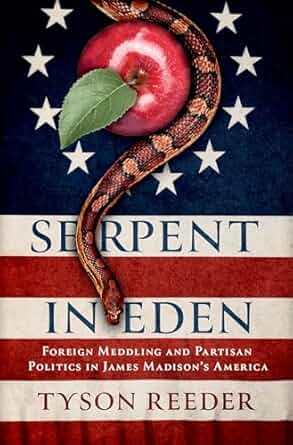 This important contribution stands out as an incredibly timely and relevant book for how we can use the past to understand the present. The consummate blend of wonderful storytelling and intriguing characters with perceptive historical analysis provides a creative take on America's diplomatic stumblings from the Revolution through the Federalist administrations of George Washington and John Adams to such key events of the Republican administrations of Thomas Jefferson and James Madison as the Mississippi Crisis, the Burr Conspiracy, and the War of 1812. Throughout this era, the vulnerability of the new nation to the schemes of frequently perfidious Europeans and the resistance of powerful Native nations and confederacies is evident. These outsiders, as Reeder shows, had every reason to think that their efforts to divide or check the United States could work.
This important contribution stands out as an incredibly timely and relevant book for how we can use the past to understand the present. The consummate blend of wonderful storytelling and intriguing characters with perceptive historical analysis provides a creative take on America's diplomatic stumblings from the Revolution through the Federalist administrations of George Washington and John Adams to such key events of the Republican administrations of Thomas Jefferson and James Madison as the Mississippi Crisis, the Burr Conspiracy, and the War of 1812. Throughout this era, the vulnerability of the new nation to the schemes of frequently perfidious Europeans and the resistance of powerful Native nations and confederacies is evident. These outsiders, as Reeder shows, had every reason to think that their efforts to divide or check the United States could work.
Through impressive research and lively writing, Reeder explores various episodes of foreign meddling and the sometimes-bumbling American responses to them, as fierce partisan politics mixed with international diplomacy. In Reeder’s book, we can see just how shaky and fragile the early United States was as internal divisions and foreign intrigue combined to threaten the federal and republican experiment. And James Madison truly was at the center of it all. The lessons Madison learned, as Reeder skillfully shows, shaped his input into the Constitution, his advice and direction as secretary of state, and then his policies and politics as president, as he sought to protect the constitutional system from both foreign interference and domestic polarization. Such a relevant book for our own times.
Thomas Jefferson and the Fight against Slavery
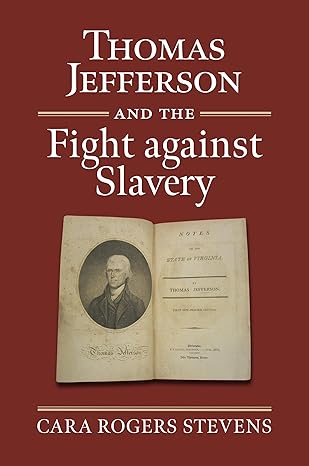 In Thomas Jefferson and the Fight against Slavery, Cara Rogers Stevens sweeps readers into the continuing controversy over the harsh contradictions between the ideals announced during America’s Founding Era and the crime of African slavery. No figure embodies those contradictions as completely as Thomas Jefferson, who inspired Americans with his insistence that all people are created equal and who drafted antislavery provisions for the Northwest Territory and the Virginia legislature, yet owned hundreds of human beings, including his life partner, Sally Hemings, and their six children.
In Thomas Jefferson and the Fight against Slavery, Cara Rogers Stevens sweeps readers into the continuing controversy over the harsh contradictions between the ideals announced during America’s Founding Era and the crime of African slavery. No figure embodies those contradictions as completely as Thomas Jefferson, who inspired Americans with his insistence that all people are created equal and who drafted antislavery provisions for the Northwest Territory and the Virginia legislature, yet owned hundreds of human beings, including his life partner, Sally Hemings, and their six children.
By closely examining Jefferson’s writings – particularly his Notes on the State of Virginia – Rogers Stevens skillfully probes Jefferson’s insights and blind spots. This insightful book fills out an often-confusing picture by tracing the antislavery views and actions of Jefferson’s leading Virginia contemporaries like George Washington, George Wythe, Edward Coles, William Short, St. George Tucker, and Francis Fauquier, Virginia’s colonial lieutenant governor. Gracefully written with deep understanding, this engaging book offers a fresh perspective on the Early Republic's greatest moral challenge and its greatest moral failure.
Speaker Biographies
Jane E. Calvert
 Jane E. Calvert (Ph.D., University of Chicago, 2003) is the Founding Director and Chief Editor at The John Dickinson Writings Project. She is currently the foremost Dickinson scholar, having worked on him for over two decades. Her book, Quaker Constitutionalism and the Political Thought of John Dickinson (Cambridge, 2009), is the first work to give a comprehensive explanation of his thought, action, and contribution to the founding of America.
Jane E. Calvert (Ph.D., University of Chicago, 2003) is the Founding Director and Chief Editor at The John Dickinson Writings Project. She is currently the foremost Dickinson scholar, having worked on him for over two decades. Her book, Quaker Constitutionalism and the Political Thought of John Dickinson (Cambridge, 2009), is the first work to give a comprehensive explanation of his thought, action, and contribution to the founding of America.
Her research has been sponsored by top institutions around the country, including the Newberry Library, the Huntington Library, the American Philosophical Society, the Library Company of Philadelphia/Historical Society of Pennsylvania, and the David Library of the American Revolution. Dr. Calvert speaks to academic and public audiences around the country on Dickinson and issues related to the American Founding.
She is a member of the Association for Documentary Editing and a 2010 graduate of the Editing Institute sponsored by the National Historic Preservation and Records Commission and the Wisconsin Historical Society. Her biography of Dickinson, Penman of the Founding, was published by Oxford University Press in October 2024.
Francis D. Cogliano
 Frank Cogliano is Professor of American History and Dean for North America, at the University of Edinburgh. A specialist in the history of the American Revolution and the early United States, he is the author or editor of ten books, including: Thomas Jefferson: Reputation and Legacy (2006), The Blackwell Companion to Jefferson (2012) and Emperor of Liberty: Thomas Jefferson’s Foreign Policy (2014). His Revolutionary America, 1763-1815: A Political History is now in its fourth edition.
Frank Cogliano is Professor of American History and Dean for North America, at the University of Edinburgh. A specialist in the history of the American Revolution and the early United States, he is the author or editor of ten books, including: Thomas Jefferson: Reputation and Legacy (2006), The Blackwell Companion to Jefferson (2012) and Emperor of Liberty: Thomas Jefferson’s Foreign Policy (2014). His Revolutionary America, 1763-1815: A Political History is now in its fourth edition.
His latest book was published by Harvard University Press (Feb 2024): Revolutionary Friendship: Washington, Jefferson and the American Republic. Along with Patrick Griffin, Christa Dierksheide and Eliga Gould he edits the Revolutionary Age series for the University of Virginia Press.
Frank Cogliano is committed to engaging a wide audience with the study of history. For many years he was a workshop leader for school teachers, and co-hosts the American history podcast The Whiskey Rebellion.
He is the incoming president of the Open History Society in Edinburgh. He has made numerous media appearances, commenting on U.S. history, politics and international relations, for the BBC and other outlets. He has made multiple appearances on the BBC’s flagship In Our Time Program.
Michael D. Hattem
Cara Rogers Stevens
 Cara Rogers Stevens is an Associate Professor of History at Ashland University, where she also co-directs the Ashbrook Scholar Program. She has a master’s degree in history from the University of Texas at Dallas and a Ph.D. from Rice University. Her research, which focuses on race, slavery, and freedom in the Jeffersonian Age, has been published by the Journal of Southern History and American Political Thought, and she has also written for the Journal of the Early Republic and Law & Liberty. She won the American Political Science Association’s award for Best Article in American Political Thought in 2022.
Cara Rogers Stevens is an Associate Professor of History at Ashland University, where she also co-directs the Ashbrook Scholar Program. She has a master’s degree in history from the University of Texas at Dallas and a Ph.D. from Rice University. Her research, which focuses on race, slavery, and freedom in the Jeffersonian Age, has been published by the Journal of Southern History and American Political Thought, and she has also written for the Journal of the Early Republic and Law & Liberty. She won the American Political Science Association’s award for Best Article in American Political Thought in 2022.
Her first book, Thomas Jefferson and the Fight Against Slavery (Kansas University Press, 2024), examines what Jefferson did—and did not—do to end slavery and bring equality to America. The book won the Herbert J. Storing Book Prize from the Ciceronian Society (2025) and was a Finalist for the Center for Presidential History Book Prize (2025).
Tyson Reeder
 Tyson Reeder (Ph.D., University of California, Davis) is assistant professor of history at Brigham Young University. His research focuses on early American transnational and international history. He is the author of Serpent in Eden: Foreign Meddling and Partisan Politics in James Madison’s America (forthcoming, Oxford University Press). He also authored Smugglers, Pirates, and Patriots: Free Trade in the Age of Revolution (University of Pennsylvania Press, 2019) and numerous articles and book chapters, and he is the editor of The Routledge History of U.S. Foreign Relations. Before joining BYU, he was an assistant professor at the University of Virginia, where he worked as an editor of the Papers of James Madison.
Tyson Reeder (Ph.D., University of California, Davis) is assistant professor of history at Brigham Young University. His research focuses on early American transnational and international history. He is the author of Serpent in Eden: Foreign Meddling and Partisan Politics in James Madison’s America (forthcoming, Oxford University Press). He also authored Smugglers, Pirates, and Patriots: Free Trade in the Age of Revolution (University of Pennsylvania Press, 2019) and numerous articles and book chapters, and he is the editor of The Routledge History of U.S. Foreign Relations. Before joining BYU, he was an assistant professor at the University of Virginia, where he worked as an editor of the Papers of James Madison.

Sponsored By The Ford Motor Company Fund
Mount Vernon has enjoyed a very special relationship with the Ford Motor Company dating back more than 90 years. We are grateful for their generous support and we applaud their abiding respect for American heritage.
 Michael D. Hattem is a historian of early America specializing in the American Revolution and historical memory. He earned his PhD in History from Yale University and has taught at Knox College and Lang College at The New School. He has authored two books and many academic articles and online essays. His work has been covered by such mainstream media outlets as the New York Times and TIME Magazine.
Michael D. Hattem is a historian of early America specializing in the American Revolution and historical memory. He earned his PhD in History from Yale University and has taught at Knox College and Lang College at The New School. He has authored two books and many academic articles and online essays. His work has been covered by such mainstream media outlets as the New York Times and TIME Magazine.